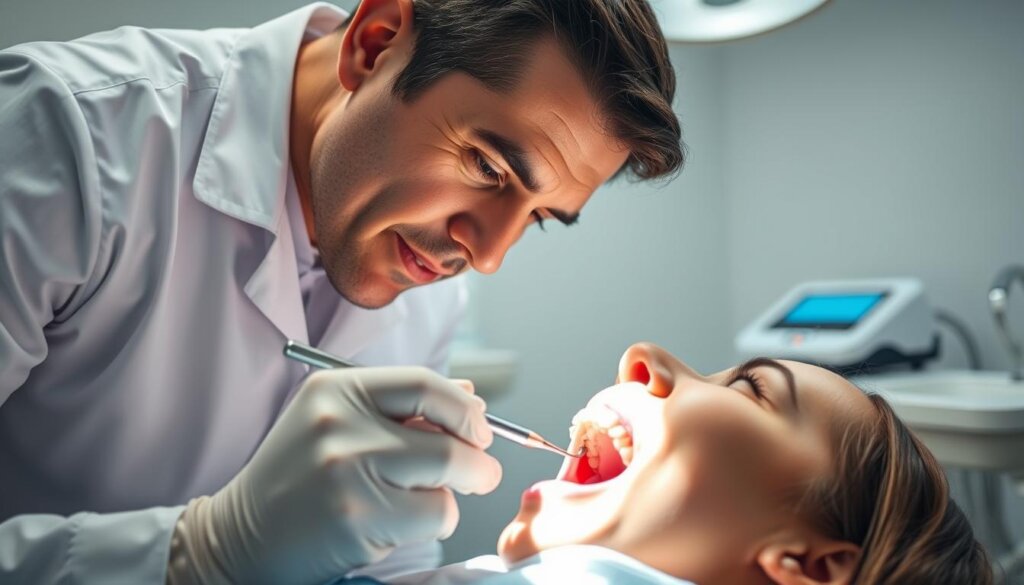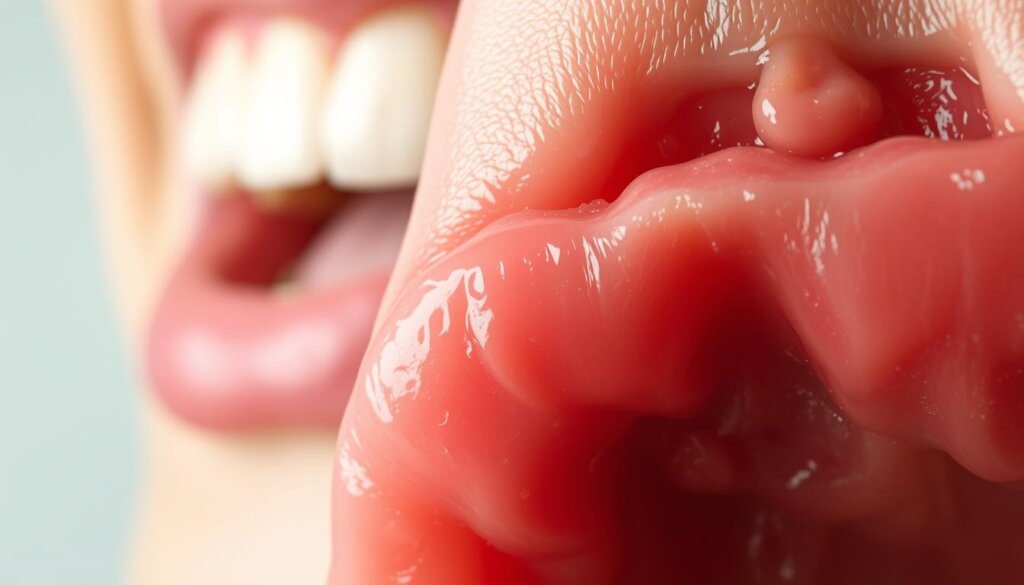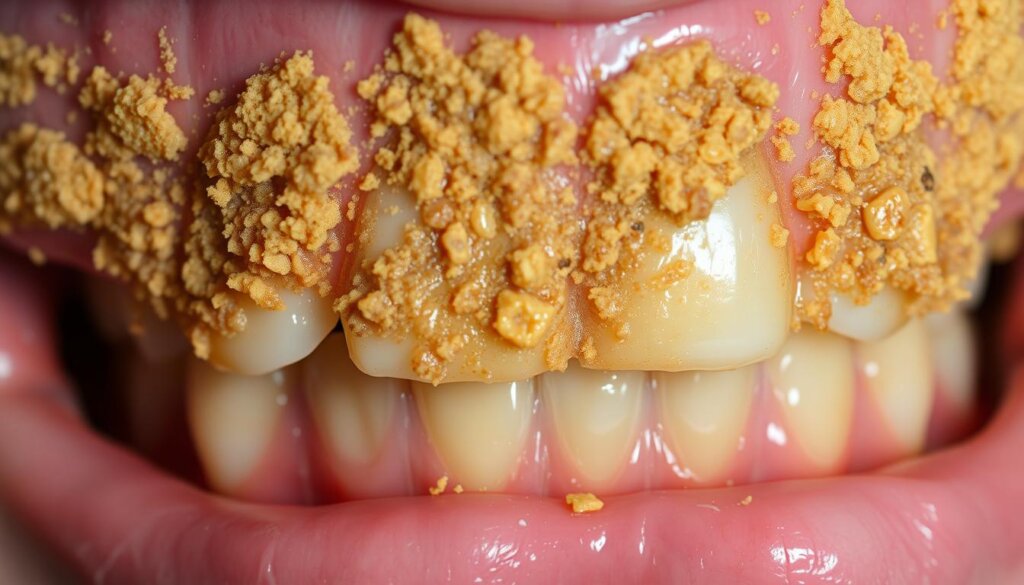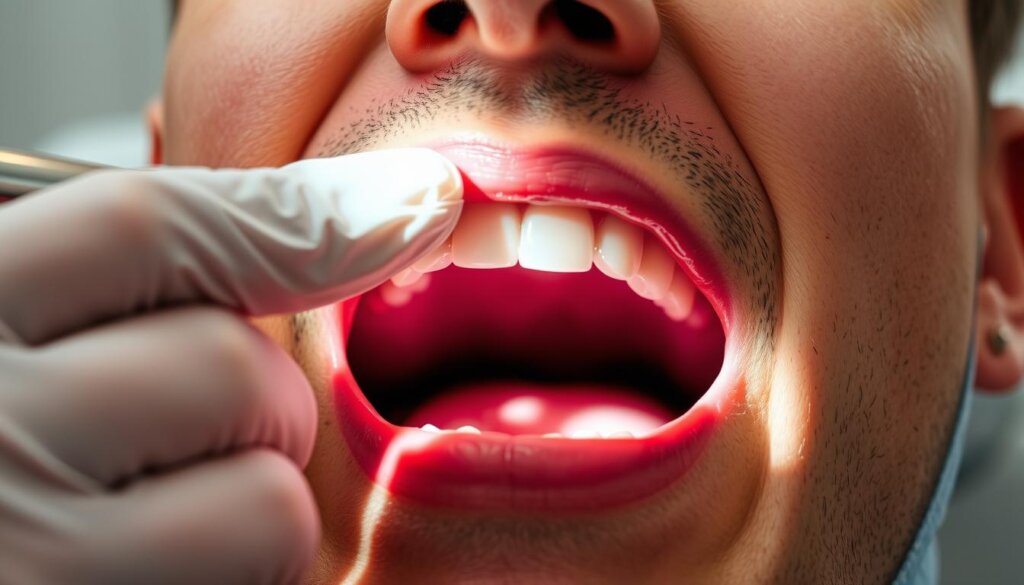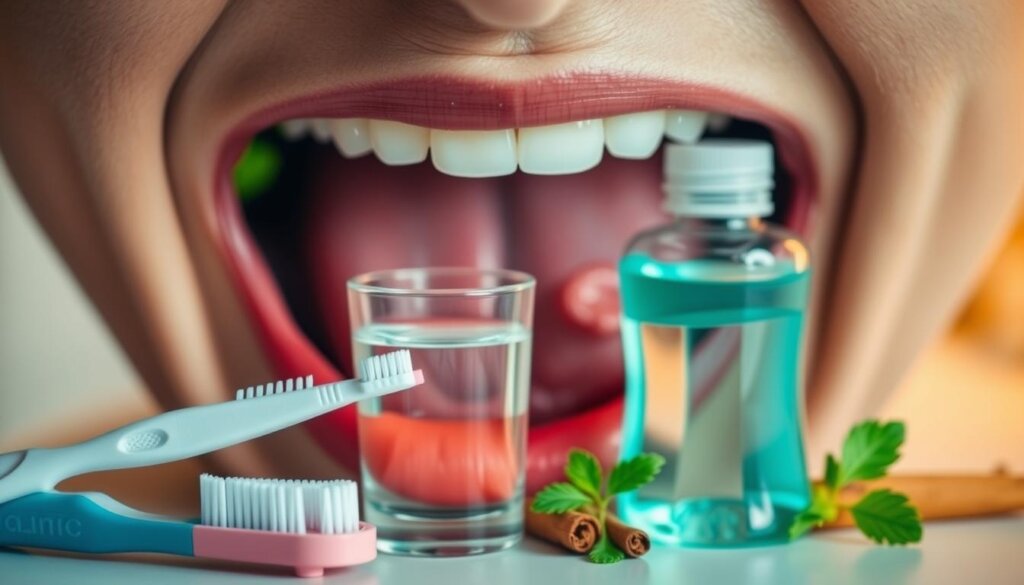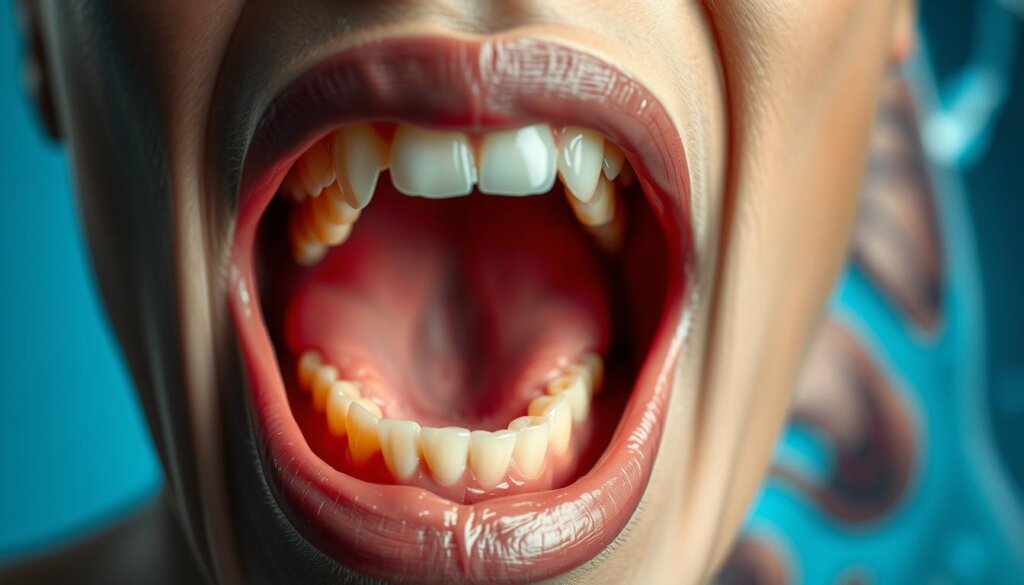What are the risks of not getting regular dental cleanings?
Skipping regular dental cleanings might lead to needing more complex dental work later. The cost of these treatments can be 10 times that of preventive care. This shows how essential routine dental visits are for your health and wallet. Keeping your mouth healthy is key to your overall well-being, not just for a good smile.
Not getting your teeth cleaned regularly can cause a lot of oral health problems. Plaque and tartar build up if not cleaned, creating a place for bacteria to grow. This can lead to tooth decay and gum disease. If gum disease isn’t treated, it can get worse, becoming periodontitis. This threatens not only your teeth but also your overall health. Knowing these risks highlights why regular dental check-ups are crucial. Oral health is closely linked to other health issues like heart disease and diabetes, according to science.
Key Takeaways
- The consequences of skipping dental check-ups can be extensive and costly.
- Risks of not getting regular dental cleanings include the development of cavities, tooth decay, and periodontal disease.
- Plaque and tartar, if not professionally removed, can escalate dental issues significantly.
- Gum disease that progresses into periodontitis can lead to loss of teeth and jawbone deterioration.
- Poor oral care is confirmed to have systemic health implications, including a higher probability of heart disease and diabetes.
- Preventive dental care is far more cost-effective compared to the expensive treatments required for advanced dental conditions.
Introduction to Dental Cleanings
Dental cleanings are key to keeping great oral health. They lower the risk of dental problems. Knowing why cleanings are vital helps people make smart choices for their oral health.
Importance of Oral Hygiene
Good oral hygiene stops serious health issues and cuts healthcare costs. Dental cleanings are important for two reasons. They get rid of plaque and tartar that brushing misses. Also, they let dentists check your oral health early on.
Overview of Dental Cleanings
Dental cleanings take care of your teeth and whole mouth. They remove plaque and tartar, polish teeth, and sometimes apply fluoride. This keeps teeth strong and stops gum disease.
Understanding why dental cleanings matter helps prevent diseases. Regular dentist visits catch problems like tooth decay and gum disease early. This shows how oral hygiene impacts health overall.
Increased Risk of Cavities
Going for regular dental cleanings is key to avoiding cavities, which point to deeper issues like tooth decay and plaque buildup. It’s vital to know how cavities form and their symptoms. This knowledge helps keep our teeth healthy and reduces dental problems.
How Cavities Form
Cavities start when plaque stays on our teeth, turning into harmful acids that eat away at the enamel. This makes the teeth weak and can lead to holes, showing cavities are forming. If we don’t clean our teeth, plaque increases and decay gets worse.
Symptoms of Cavities
Finding cavities early can lessen their effect on our teeth. Look out for holes in your teeth, pain, sensitivity to sweet, hot, or cold things, and pain while chewing. It’s important to recognize these signs early to tackle tooth decay quickly.
Long-term Consequences
If we ignore cavities, they can cause serious dental problems like abscesses, infections, and even tooth loss. The treatments for these advanced issues can be much more difficult and expensive, like needing root canals or crowns. So, it’s crucial to prevent plaque and avoid these risks.
| Impact | Without Regular Cleaning | With Regular Cleaning |
|---|---|---|
| Plaque Accumulation | High | Low |
| Risk of Cavities | Increased | Greatly Reduced |
| Long-term Health | Potential for Severe Decay | Healthier Teeth and Gums |
Gum Disease and Its Impact
Gum disease often goes unnoticed but can lead to major problems. These include chronic bad breath and lasting damage to teeth. It’s important to know how gum disease starts and gets worse. This helps in stopping it early.
What is Gum Disease?
Gum disease begins with gum swelling called gingivitis. Without care, it can become periodontitis. This is a worse condition that may cause tooth loss and other health issues.
Stages of Gum Disease
Gum disease develops in stages, starting with gingivitis. This stage has mild symptoms that many overlook. If not treated, it turns into periodontitis. This stage greatly raises the chance of lasting tooth damage.
Signs to Watch For
Look out for signs of gum disease like constant bad breath, gums that bleed when you brush or floss, and gums that pull back from your teeth. Don’t ignore these warnings.
The table below shows the difference between early and late gum disease. It shows why catching it early and treating it is key.
| Stage | Symptoms | Potential Consequences |
|---|---|---|
| Gingivitis | Red, swollen gums, and bleeding during brushing | Reversible with proper care, no permanent damage |
| Periodontitis | Chronic bad breath, loose teeth, and pus between teeth and gums | Permanent dental damage, increased risk of tooth loss |
Visiting the dentist regularly and keeping up with oral hygiene are key to avoiding gum disease. Learning about gum disease signs and how to prevent them can make a big difference in your mouth and overall health.
Tartar Buildup and Its Effects
It’s key to understand how tartar forms and its impact on oral health. Tartar, also known as dental calculus, is hardened dental plaque on the teeth. Without regular cleanings by a dentist, this hard substance builds up. This leads to many oral health problems.
How Tartar Develops
Tartar starts off as plaque, a sticky layer of bacteria on teeth. If not cleaned away through daily brushing and flossing, it picks up minerals from saliva and turns into tartar. This highlights the risks of not keeping up with oral hygiene.
Consequences of Tartar
Skipping dental appointments often reveals the downsides of tartar. Not only does it cause teeth discoloration and cavities, but it also leads to gum problems. Tartar’s bacteria release harmful toxins, hurting and damaging gums. This can result in serious oral health issues that are expensive and complex to fix.
Prevention Tips
- Maintain daily brushing and flossing to minimize plaque buildup.
- Schedule regular dental check-ups for professional cleaning and examination.
- Consider using an antiseptic mouthwash that helps reduce plaque bacteria.
- Eat a balanced diet and limit sugary snacks to lessen the risk of plaque formation.
Going to the dentist regularly is key in stopping tartar from forming and reducing the impact on overall health. Following these prevention steps can greatly cut down the risk of getting dental and gum diseases. This shows how important it is to care for your mouth proactively.
Oral Cancer Detection
Getting your teeth cleaned by a professional isn’t just good for oral hygiene. It’s key for spotting oral diseases early, like cancer. The importance of dental cleanings is huge because they do more than clean off plaque and tartar. These cleanings let dentists look for early signs of oral cancer, which might only show as small changes in the mouth.
The benefits of regular dentist visits cover a lot, especially for preventing cancer. A dentist looks over your whole mouth during a cleaning. They check for any odd spots or lesions that could mean oral cancer. Finding these early is important. It can mean getting the right treatment fast, which can save lives.
Importance of Early Detection
Finding oral cancer early is key for beating it. Catching it early often means treatment will work better, with less harsh methods needed. Regular cleanings help catch these early signs before they turn into bigger problems.
How Cleanings Help
During routine cleanings, dentists are on the lookout for early signs of oral cancer. They know what to look for, like sores that won’t go away, odd colored patches, or lumps. They’re trained to tell these signs from less serious issues, which means they can send you for tests or to a specialist if needed.
Signs of Oral Cancer
Knowing what oral cancer looks like helps you get help sooner. Some signs to watch for include bleeding for no reason, numbness, sores that don’t heal in two weeks, and constantly sore throat or voice changes. Knowing these signs, along with the importance of dental cleanings for spotting them, shows why regular dentist visits are so beneficial.
Dental professionals do more than just clean; they’re the first to spot oral diseases, like cancer. Emphasizing preventive care through these cleanings can greatly lower the risk of serious health problems. This makes regular dental appointments a crucial part of staying healthy.
Bad Breath: A Common Consequence
Chronic bad breath, known as halitosis, is more than an embarrassing issue. It can signal that your oral health needs attention. Knowing what causes it and how to treat it is key.
It often comes from not keeping your mouth clean. Bacteria break down food in your mouth, making bad odors. Getting dental cleanings and the right treatment for bad breath is important.
Causes of Bad Breath
- Accumulation of bacteria on the tongue
- Decomposing food particles between teeth
- Gum diseases like periodontitis
Treatment Options
- Regular professional dental cleanings
- Antibacterial mouthwashes and toothpastes
- Prescription medications for underlying health issues contributing to bad breath
Prevention Strategies
- Maintain a consistent oral care routine, including brushing twice daily and flossing.
- Stay hydrated to ensure adequate saliva production, which naturally cleanses the mouth.
- Regular dental check-ups to address potential oral health issues promptly.
Treating chronic bad breath the right way helps with keeping your mouth healthy. It also makes you more confident and better in social situations.
| Condition | Impact | Treatment |
|---|---|---|
| Gum Disease | Significant contributor to chronic bad breath | Deep cleaning, antibiotics |
| Dry Mouth | Reduces saliva, worsening odor | Hydration, saliva substitutes |
| Unclean Dentures | Traps food particles and bacteria | Regular cleaning, proper storage |
Impact on Overall Health
The connection between oral health and overall health is deep. It shows how important dental care is for our entire body. Knowing about this helps us take better care of our teeth and health.
| Systemic Condition | Impact of Poor Oral Health |
|---|---|
| Diabetes | Higher glucose levels in saliva may promote gum disease, complicating diabetes management. |
| Respiratory Infections | Bacteria from inflamed gums can be inhaled into the lungs, leading to respiratory issues. |
Keeping your mouth healthy stops serious conditions like diabetes and respiratory infections. Regular dental cleanings and taking care of your mouth can really improve your health.
- Reduces the risk of infections that can exacerbate systemic illnesses
- Helps manage blood sugar levels in diabetes patients
- Decreases the likelihood of developing respiratory diseases
By taking care of your mouth, you help your whole body stay healthy. This shows how important good oral health is for a life without diseases.
Higher Treatment Costs
It’s key to understand how dental health choices affect costs, especially when looking at prevention vs. treatment. Regular cleanings cut down on future dental expenses. They prevent the need for costly treatments caused by neglect.
Cost of Dental Procedures
Dental procedure costs vary based on the treatment. Yet, it’s known that preventive care like cleanings is cheaper than corrective actions. Procedures like fillings or crowns cost more later.
Comparing Preventive vs. Reactive Care
| Treatment Type | Preventive Care Cost | Reactive Treatment Cost |
|---|---|---|
| Regular Cleaning | $75 to $200 | |
| Fillings | $150 to $400 | |
| Root Canal | $700 to $1,500 | |
| Crowns | $1,000 to $3,500 |
Financial Advice
Seeing a dentist regularly limits serious dental issues and costs. Think of dental health as an investment. By paying a little for prevention, you dodge high costs of major treatments.
Investing in routine cleanings and home care keeps your mouth healthy and saves money. Regular dental visits save your smile and your wallet over time.
Aesthetic Concerns
Having a nice smile is about more than just looking good. How one’s teeth look, including their smile aesthetics, really matters. It affects how we interact with others and our job chances. When teeth start to discolor or show signs of neglect, it can hurt our self-esteem. This makes us less confident at home and in front of others.
People often overlook how a neglected smile can hurt their career. A bright smile is a big plus in jobs where first impressions count a lot. Getting regular dental cleanings helps stop stains and tartar. This not only keeps teeth healthy but also boosts a person’s mood.
Getting your smile fixed up by experts, like teeth bonding specialists, can make a big difference. These treatments fix discoloration and small flaws. This makes your smile look better.
Think about how fixing your smile can open doors for you. Below is a table showing how improvements in dental looks can boost confidence. They also help in job-related situations:
| Dental Improvement | Impact on Self-Esteem | Professional Enhancement |
|---|---|---|
| Whitening treatment | Increases self-confidence | Improves first impressions |
| Orthodontic alignment | Boosts personal satisfaction | Enhances perceived competence |
| Regular cleaning | Maintain a positive self-image | Supports ongoing professional interactions |
| Composite bonding | Restores smile integrity | Encourages more positive engagement with clients |
Taking care of your dental health is key. It not only helps you stay healthy but also shapes how others see you. This is very important in professional settings.
Child and Adolescent Oral Health
Taking care of dental health from a young age is key. Starting early dental habits helps kids have healthy mouths for life. It’s important to take care of children’s and teenagers’ teeth right away. This way, we help their health now and teach them how to take care of their teeth forever.
Starting dental visits early makes them seem normal and less scary. Being proactive about child oral care shapes how kids think and feel about dental health for their whole lives.
- Importance of Early Dental Cleanings: It’s good to start dental check-ups early. This helps spot growth problems and prevents tooth decay even before all baby teeth are in.
- Lifelong Habits Formed: Seeing the dentist regularly from a young age builds important dental habits. This routine helps avoid dental problems later on and keeps overall health in check.
- Addressing Fear and Anxiety in Kids: Positive dental visits early on make kids less scared of the dentist. This leads to a relaxed and willing patient who keeps up with dental visits.
So, teaching early dental habits doesn’t just help now. It sets kids up for a lifetime of pediatric dental health, making these habits a normal part of their lives and ensuring a healthier future.
Regular Checkups and Cleanings
Knowing why dental appointments are important is key to good health. These visits are more than just a simple check-up; they are an essential part of taking care of your teeth. Let’s explore what happens during these visits and why going regularly matters.
What to Expect During a Cleaning
A regular dental visit includes a deep cleaning to get rid of plaque and tartar. These are the main reasons for tooth decay and gum problems. Dentists also check for decay, inspect old dental work, and look at gum health.
Dental offices use modern tools to get a better look at your oral health. This helps them decide what care you might need next.
Frequency Recommendations
How often should you see the dentist? Every six months is usual. But, some people might need to go more often. Going to the dentist regularly helps find problems early and prevents small issues from getting big.
Building a Dental Home
Finding a dental office you trust and sticking with regular visits is key. This commitment makes dental visits a normal part of family life. It helps everyone keep up with their dental health.
Having a go-to place for dental care makes keeping your teeth healthy easier. It also shows how important dental appointments are.
| Benefits of Regular Dental Visits | Consequences of Neglecting Visits |
|---|---|
| Early detection of oral health issues | Progression of undetected dental conditions |
| Maintenance of dental work integrity | Failure of previous dental treatments |
| Consistent professional upkeep of oral hygiene | Buildup of plaque and tartar leading to decay |
By making dental checkups a part of your life, you understand their importance. This, along with good dental hygiene, helps keep your mouth and body healthy.
The Role of Dental Hygiene at Home
Taking care of your teeth doesn’t stop when you leave the dentist. Daily habits at home are crucial for good oral health. These habits add to the work done in dental cleanings. They help prevent common tooth problems.
It’s important to brush twice a day with fluoride toothpaste. This stops plaque build-up and fights tooth decay. Using an antibacterial mouthwash with brushing lowers bacteria levels, helping prevent gum disease.
Flossing is very important too. It lets you clean between teeth and along the gum line where brushing can’t reach. Flossing gets rid of trapped food and plaque. This lowers the risk of tartar, cavities, and gum disease.
Good dental care at home does more than keep your mouth clean. It makes dental cleanings more effective. By reducing plaque and keeping your mouth healthy at home, dental visits can focus on deep cleaning and spotting early health issues.
Conclusion
Throughout this article, we’ve seen the dangers of skipping dental checkups. Ignoring dental visits can lead to cavities and serious gum disease. This neglect can cause major problems, even affecting our whole body’s health.
We must understand and act on the need for good oral health. Encouraging visits to the dentist means promoting a way to avoid health issues before they start. Every dental checkup is a step towards protecting our health for the long run.
To wrap up, our discussion shows that dental health is vital in our lives. Daily oral care and professional cleanings are key to keeping us healthy. Let’s make oral health a priority, get regular checkups, and see how it improves our life.


